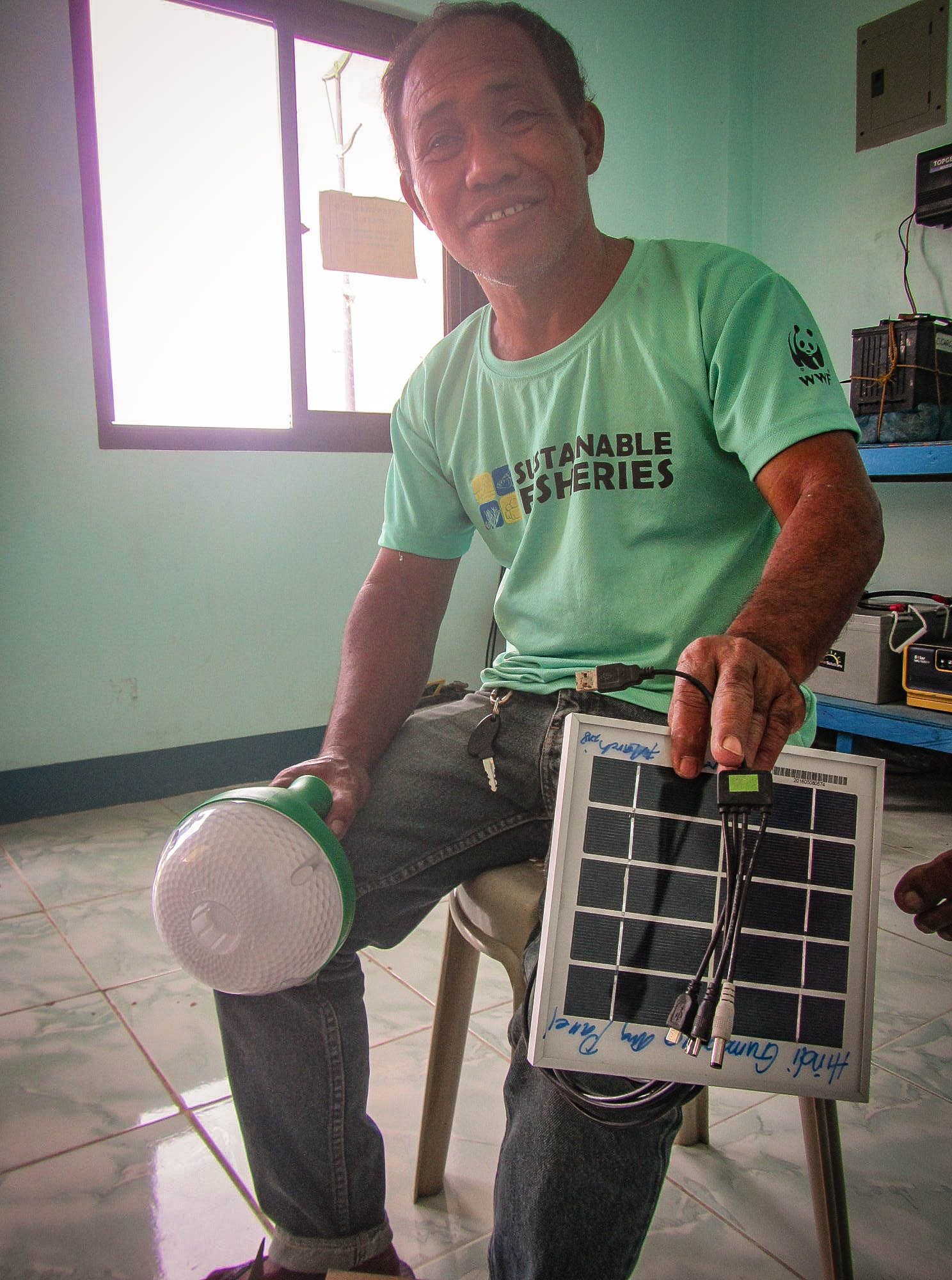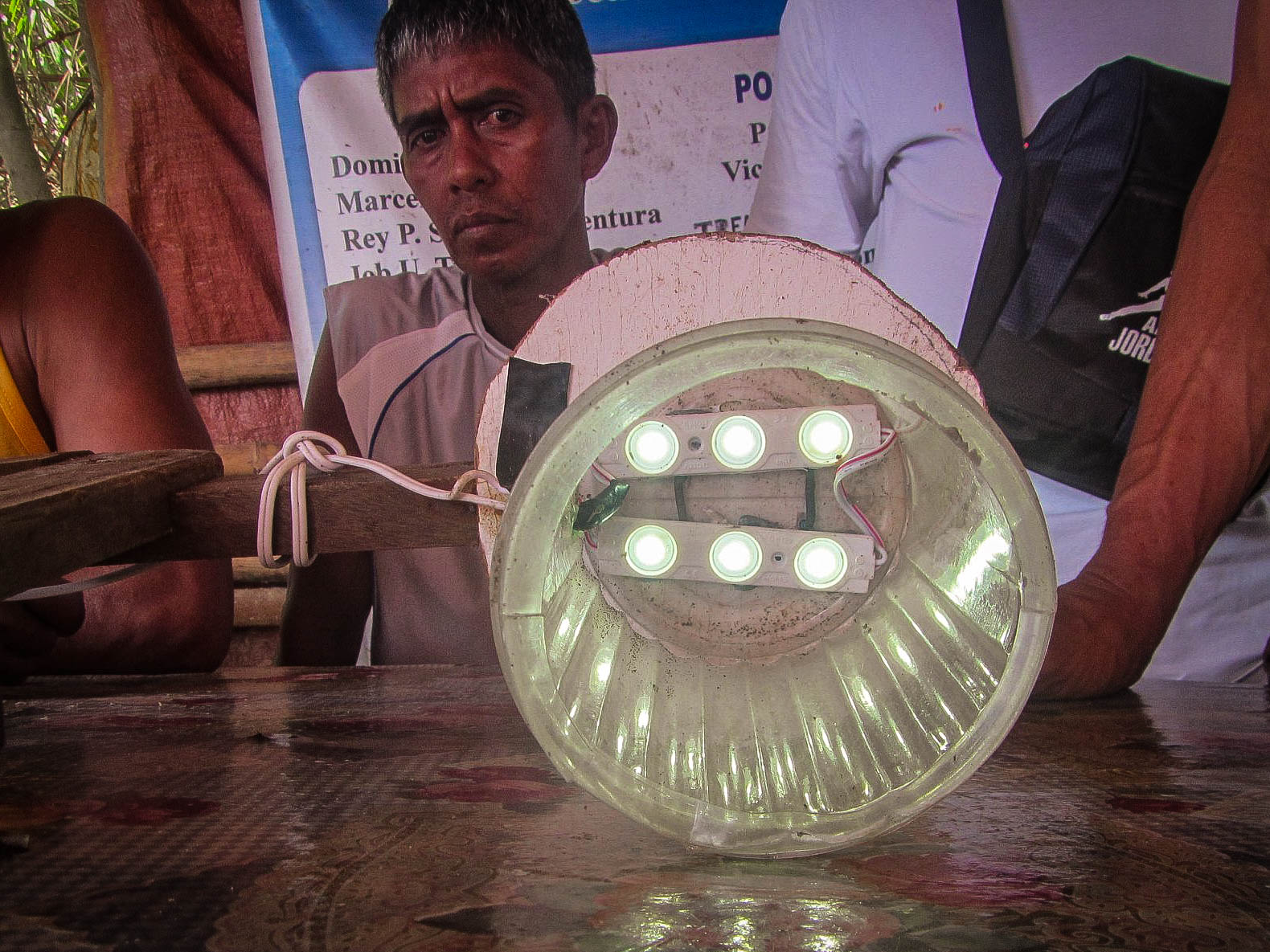Positive Effects Felt with the Introduction of Solar Power to Fishing Communities in Lagonoy Gulf
February 2019

Jaime Coralde, Chief Bantay Gubat of Sagñay, Camarinas Sur, sits with a solar panel donated by WISIONS for Sustainability through WWF-Philippines as part of the Solar Powered Central Landing Area for Night Fishing in Lagonoy Gulf. In 2017, WWF-Philippines implemented solar-powered projects to support partner fishing communities in Bicol. Photograph © Joann Binondo
The annual Earth Hour urges the world to switch off the lights for 60 minutes as a symbol of commitment to the conservation of the planet. Beyond the hour, participants are encouraged to shine a light on climate change by being more sustainable – something that’s already being practiced in the rural fishing communities of coastal Bicol, as the lights shine brightly on a future that runs on renewable energy.
In 2017, WWF-Philippines, together with WISIONS for Sustainability, implemented solar-powered projects in two coastal municipalities facing Lagonoy Gulf, namely a battery array and light-emitting diode (LED) technology complement at the Dolo Port in San Jose, and a solar charging station with hand-held lamps in Sagñay as part of Solar Powered Central Landing Area for Night Fishing in the Lagonoy Gulf project. These communities have been WWF-Philippines beneficiaries since 2011, as project sites to the Partnership Program Towards Sustainable Tuna (PPTST) and Sustainable Tuna Partnership (STP) projects.
These solar projects were conducted in an effort to improve basic services to these communities in a way that is mindful of the environment. In San Jose, where LED lights were installed, the local government was able to lower their electricity expenses while providing feelings of safety to community members in the bay area.

Fishermen in Lagonoy Gulf sit around a makeshift LED light powered by a solar battery, also donated by WISIONS for Solutions through WWF-Philippines in 2017. Photograph © Joann Binondo
Improvements to family life have also been recorded in the two communities since the introduction of solar interventions. Since the LED lights were installed at Dolo Port in San Jose, children have been seen playing along the docks while cargo and tourist ships make port in the evening, bolstering the local economy. Meanwhile, residents of Sagñay have reported being able to spend more time with their families and to save more money for household expenses as they no longer need to travel to neighboring municipality Tigaon for fuel.
Public health and safety has also improved in Sagñay. The introduction of hand-held lamps has allowed Sagñay fishermen to shift from kerosene lamps, which pose a fire hazard to their boats. Fishermen are now also free to sleep throughout the night, since community members no longer have to mind the lamps to prevent the outbreak of fire.
“It’s very fulfilling for us to hear from our stakeholders that integrating these climate-smart technologies in our initiatives toward sustainable fisheries has provided benefits both to their families and to coastal communities on a whole,” says Joann Binondo, WWF-Philippines Sustainable Tuna Project Manager. The solar projects conducted in Lagonoy Gulf are in line with WWF-Philippines’ goal of ensuring long-term economic prosperity and food security for communities without compromising the environment.
As environmentally-friendly movements continue to grow, the more there is pressure for individuals and communities alike to adopt green practices and technologies. With the success of solar power in the fishing communities of Lagonoy Gulf, it is clear that all stratums of Philippine society can shift toward sustainability, and that they stand to benefit from such developments. The hope is for other communities to be given the opportunity to do the same as we flip the switch on fossil fuels and say yes to renewables.
For more information, please contact:
Communications & Media Manager Mr. Dan Ramirez (dramirez@wwf.org.ph)
-
WWF-Philippines Sustainable Tuna Parterships Project Manager Ms. Joann Binondo (jbinondo@wwf.org.ph)
